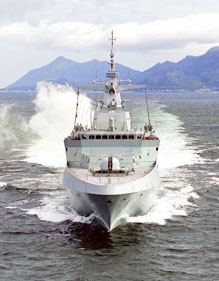
This opinion piece by Right2Know journalist and researcher Kholiswa Tyiki takes a critical look at the Seriti Commission's seeming reluctance to make crucial documents available to cross-examiners, and calls for more public participation and pressure for the full truth to be revealed.
The arms deal, which saw South Africa spending up to R70-billion on military equipment in the late 1990s and early 2000s, has faced numerous accusations of corruption, accusations that go right up to the president himself. Facing legal threats in late 2011, Jacob Zuma set up the Seriti Commission to investigate these allegations.
But for the past year since it started its work, the Seriti Commission, chaired by Judge Willie Seriti, has attracted a lot of criticism, and there are serious concerns about its integrity and impartiality. As the commission heads into the second phase of its work – where it must probe allegations of massive corruption in the arms deal – there hasn't been enough public engagement with these concerns. So what is happening at the commission?
Sudden resignations and concerns of a “second agenda”
The first worrying signs appeared in early 2013 when two members of the commission resigned in protest. In his letter of resignation, Norman Moabi, a lawyer and former acting High Court judge, claimed that the commission was concealing a “second agenda”. He accused the chairperson of a “total obsession with the control of the flow of information”, hinting that the commission’s work was being guided by “unknown person(s)”.
In March, attorney Kate Painting also resigned, later stating that “fear is a common theme at the commission and any non-compliance with the second agenda is met with hostility.”
Secrecy and the Seriti Commission
Lawyers for Human Rights (LHR) is representing three critics of the arms deal: former ANC MP Andrew Feinstein and researchers Paul Holden and Hennie van Vuuren, who have been called to testify about evidence of corruption. But the commission has denied them access to crucial documents that are needed to get to the truth. After struggling for nearly 18 months to get the commission to release these documents, LHR has posted a list of all the information that is being withheld.
This includes minutes of meetings where the deals were discussed and decided on, and all the evidence that was collected by the various law-enforcement investigations that took place in the 2000s. Aside from the fact that this is needed by LHR and its clients to prepare their own testimonies, it is also information that should be at the heart of a public inquiry about the arms deal; it should be available to all.
Refusing to engage with evidence of corruption
At the same time, the commission is ignoring evidence that is in the public domain.
One example is a draft report by the auditor-general which investigated allegations of the arms deal in 2000. Though the final version of the report gave the arms deal a clean bill of health, the draft report has come to light. It found many irregularities, but was apparently revised completely before being released. It is vital evidence both of irregularities in the arms deal but also attempts to cover up irregularities afterwards. But Judge Seriti ruled that as a draft report it is not admissible without the author testifying to its contents.
The commission has also refused to engage with a report commissioned by German arms company Ferrostaal which gives details of their own involvement in bribery. Although the document has been in the public domain for several years and has received a lot of media coverage, and reportedly was part of the Hawks' investigation, the commission has ruled that it is inadmissible because it is a leaked document.
As Bob Marley once said: “In the abundance of water the fool is thirsty”.
Leading a one-sided process
LHR has also expressed concern that the commission is leading a one-sided process. When former trade and industry minister Alec Erwin testified, key documents which LHR needed for his cross-examination were still classified. (Some have since been declassified.) Without access to those documents, LHR said it would have to recall Mr Erwin once the documents had been received, but after a debate about cross-examination Judge Seriti excused Erwin, saying, “Thank you Mr Erwin, no-one wants to cross-examine you.”
A similar situation arose when former rear-admiral Jonathan Kamerman appeared before the commission. LHR in this case was given permission to cross-examine at a later date.
In both cases LHR was not in a position to cross-examine the person testifying, and ask the questions that the commission itself is not asking, because information was only made available at the last minute or not available at all.
What is the way forward?
The arms deal itself happened more than 15 years ago under a cloud of secrecy and lack of accountability. Sadly the commission may be following a similar path. At best its approach is playing into the hands of those who benefited from the deal and those who don't want the full truth to come to light.
The public needs to make its presence felt at the commission, and to start by arming ourselves with information. If we are not happy with its approach, we can choose either to challenge it, or to withdraw. Withdrawing comes at a cost, as we may never get to the truth.
If the Seriti Commission fails the public, how will the citizens of this country recover from such a betrayal? And who will ever be motivated again to take a stand against secrecy and corruption?
See also:
-
Corruption Watch’s updates and analysis of the Seriti Commision.
-
Corruption Watch’s What You Need to Know About the Arms Deal

